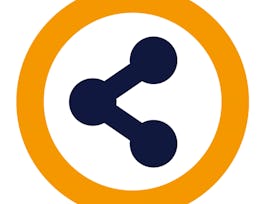The post-truth world is a divided and partisan environment in which factual information has been displaced by subjective and biased viewpoints. Facts and expertise no longer matter when isolated communities deny truth and scientific reasoning in favor of whatever information suits their needs or aligns with their beliefs. Social media and emerging technologies have the power to connect global participants in a meaningful way; yet, they have also led to disconnected communities that fail to communicate past their own self-imposed boundaries. In this course, you will gain insights to recognize your own biases and identify preconceptions in today’s dynamic social information environment. Through metaliteracy, you will practice self-reflective, metacognitive processes and reexamine fixed mindsets. Together, we will consider the importance of facts and expertise in reinventing a truthful world based on inclusive communities of trust. This course will empower you to be a reflective consumer and a creative, responsible producer of information, and to raise and share your voice in this post-truth milieu.

Offrez à votre carrière le cadeau de Coursera Plus avec $160 de réduction, facturé annuellement. Économisez aujourd’hui.


Empowering Yourself in a Post-Truth World



Instructeurs : Dr. Thomas P. Mackey
4 124 déjà inscrits
Inclus avec 
(16 avis)
Ce que vous apprendrez
Learn how to address post-truth problems through metaliteracy
Evaluate your biases and those of others when interacting with information
Show that you are able to consume, produce, and share information in ways that you can be proud of
Compétences que vous acquerrez
- Catégorie : digital citizenship
- Catégorie : self-directed learning
- Catégorie : Media Literacy
- Catégorie : information literacy
Détails à connaître

Ajouter à votre profil LinkedIn
9 devoirs
Découvrez comment les employés des entreprises prestigieuses maîtrisent des compétences recherchées


Obtenez un certificat professionnel
Ajoutez cette qualification à votre profil LinkedIn ou à votre CV
Partagez-le sur les réseaux sociaux et dans votre évaluation de performance

Il y a 6 modules dans ce cours
What is the post-truth world? In a post-truth world, subjective biases and uninformed opinions have challenged or replaced objective facts and scientific reasoning. Technologies originally designed to connect global participants have created a profound disconnect among users based on partisan ideologies and beliefs. Metaliteracy empowers learners to engage in this partisan environment because it supports metacognitive thinking to reflect on individual biases, preconceptions, and prejudices. As a metaliterate learner, you will learn how to take charge of your learning by identifying your own strengths and areas for continued growth. In this module we will introduce you to the metaliteracy model, which will prepare you to be an informed consumer and creative producer of new knowledge. You will explore the active roles you take on as a creator of new information, such as communicator, researcher, and teacher in collaborative social environments.
Inclus
4 vidéos8 lectures2 devoirs2 sujets de discussion
This module will delve into the realms of expertise and authority in connection with both people and information sources. How are expertise and authority connected? How does one determine authority? What impact do one’s beliefs have on perceptions of authority? The module will also consider the impact that the participatory Web has had on our ability to find, process, and respect the voices of experts. There are many advantages to having the world at our fingertips--but how can we be more aware of our biases and those of others so that we can develop metaliterate ways of being responsible information consumers and creators within our own communities?
Inclus
3 vidéos5 lectures2 devoirs2 sujets de discussion
In this module, we will explore how metaliteracy prepares individuals to understand the risks and opportunities involved with online environments. In addition, we will describe the active roles that metaliterate learners play in participatory environments to help build communities of trust. Generally, we create communities by working collaboratively toward a common goal and producing information that is authentic and reliable. As part of this module, we will work together to expand the definition of trust in online communities. This will include the exploration of challenges in the post-truth world when online environments can be divisive, untrustworthy and unsecure. How do we know what and who to trust in online environments, especially when the meaning of truth itself has diminished in the larger societal and political landscape? In this module, we will explore security breaches involving social media platforms in which the personal data of trusting participants was shared without permission. We will raise questions about the accountability of the social media providers as well as your responsibility to critically examine online platforms as you participate in these communities.
Inclus
1 vidéo3 lectures1 devoir1 sujet de discussion
This module will explore misrepresentation in constructed media to prepare individuals to be effective consumers and producers of information in a wide range of formats and settings. Information takes many forms, including text, image, and sound combined through multimedia and circulates instantaneously through a social network. The synergy of word and image is an especially dynamic combination that is powerful artistically and as a form of communication, but has also been used to misrepresent the facts. In a post-truth world, there has been an intentional misuse of images to communicate inaccurate or false narratives. The emergence of “fake news,” for example, intentionally juxtaposed words and images to convey misleading or downright false information.In this networked world of social media and mass communications, there has also been a change in how we understand established editorial filters associated with professional news gathering and publication. Social technologies have empowered individuals to document alternative perspectives once hidden. This has been an empowering development that effectively leveraged our connected world to challenge traditional hierarchies and assumptions, and often revealed injustices or brought new voices to the fore. At the same time, we have seen the advance of a post-truth world based on the proliferation of false and misleading information that has been created and shared through media without the benefit of proper vetting by experts. As part of this exploration, we will examine a number of related questions: If everyone is now making and sharing content, who plays the role of editor to disseminate truthful information? How do we prepare social media participants to discern what is contextually accurate? What is the role of the consumer in a mass-media environment?
Inclus
2 vidéos2 lectures2 devoirs2 sujets de discussion
At this point in the course, you have an understanding of the issues surrounding post-truth. You have also learned about metaliteracy as an empowering model for confronting these problems. In the last module, you investigated how media can misrepresent the truth and took on the role of the editor to examine the impact of choices you make as an information producer. The original vision for social media was to create communities by connecting people in participatory democratic spaces, but this vision has been subverted by proprietary, political, and malicious interests. These could range from creating fake accounts that spread disinformation to cyber crime and online trolling. By raising and sharing our voices and building responsible communities of trust there is hope to move beyond the post-truth world. What is your responsibility in doing so? This module will introduce you to examples where individuals strive to empower and bring value to others by sharing their voices and experiences. It will also delve into the specific metaliterate learner characteristics that will support you as an effective participant who consumes and produces truthful information. As you continue developing as a metaliterate learner, you can help play a part in reclaiming the promise of the connected world.
Inclus
3 vidéos5 lectures2 devoirs4 sujets de discussion
Through the creation and sharing of your final project, realize your vision for how you would reinvent a truthful world as an empowered metaliterate learner. Reflect on how you would apply the lessons learned in this MOOC to address the challenges of the post-truth world. Imagine how we would work together to effectively build a new future of truth and reason based on interrelated communities of trust. Think about how we move past the use of social media and emerging technologies to simply connect individuals in order to build online communities in which participants collaborate in purposeful ways to solve problems and make meaning. Reflect on what is required to move from post-truth circumstances to a future built on truth, trust, and both individual and community empowerment.
Inclus
1 vidéo1 lecture1 évaluation par les pairs1 sujet de discussion
Instructeurs



Offert par
Recommandé si vous êtes intéressé(e) par Personal Development

Arizona State University

Erasmus University Rotterdam

University of Colorado Boulder

The University of Edinburgh
Pour quelles raisons les étudiants sur Coursera nous choisissent-ils pour leur carrière ?




Avis des étudiants
Affichage de 3 sur 16
16 avis
- 5 stars
68,75 %
- 4 stars
25 %
- 3 stars
0 %
- 2 stars
0 %
- 1 star
6,25 %
Révisé le 17 déc. 2021

Ouvrez de nouvelles portes avec Coursera Plus
Accès illimité à plus de 7 000 cours de renommée internationale, à des projets pratiques et à des programmes de certificats reconnus sur le marché du travail, tous inclus dans votre abonnement
Faites progresser votre carrière avec un diplôme en ligne
Obtenez un diplôme auprès d’universités de renommée mondiale - 100 % en ligne
Rejoignez plus de 3 400 entreprises mondiales qui ont choisi Coursera pour les affaires
Améliorez les compétences de vos employés pour exceller dans l’économie numérique
Foire Aux Questions
Access to lectures and assignments depends on your type of enrollment. If you take a course in audit mode, you will be able to see most course materials for free. To access graded assignments and to earn a Certificate, you will need to purchase the Certificate experience, during or after your audit. If you don't see the audit option:
The course may not offer an audit option. You can try a Free Trial instead, or apply for Financial Aid.
The course may offer 'Full Course, No Certificate' instead. This option lets you see all course materials, submit required assessments, and get a final grade. This also means that you will not be able to purchase a Certificate experience.
When you purchase a Certificate you get access to all course materials, including graded assignments. Upon completing the course, your electronic Certificate will be added to your Accomplishments page - from there, you can print your Certificate or add it to your LinkedIn profile. If you only want to read and view the course content, you can audit the course for free.
You will be eligible for a full refund until two weeks after your payment date, or (for courses that have just launched) until two weeks after the first session of the course begins, whichever is later. You cannot receive a refund once you’ve earned a Course Certificate, even if you complete the course within the two-week refund period. See our full refund policy.

